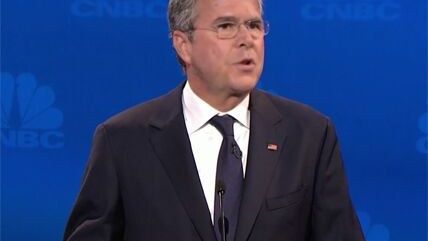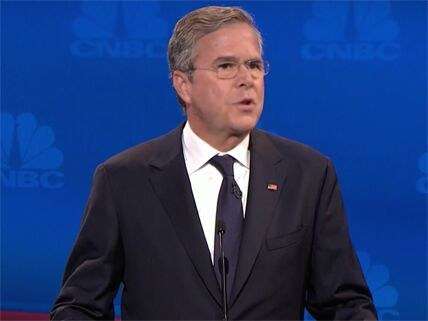The Jeb Bush Doomsayers Become Jeb Bush Doomshouters
It's hard to determine a winner in last night's awkward debate, but there was one clear loser.


The two biggest narratives emerging from the debate last night are both fairly obvious to anybody who actually watched it: The moderation of the debate itself was a disaster (this is true even if we consider that candidates should be savvy and prepared enough to deal with the types of questions CNBC threw their way); and, holy crap, is Jeb Bush toast.
As for the first narrative, I'd say that causing all these candidates to temporarily unify and go after the moderators instead of each other is quite an accomplishment. They can work together! My perception of the unfolding disaster and my own frustration was not necessarily that the moderators were aggressive, or biased, or even openly hostile. There were some really good efforts to drill down into the meat of candidate proposals and force them to acknowedge flaws. The problem was that moderators wanted to touch on too many different things when there were still too many candidates in the field. This meant they attempted to confine important policy-related questions to just a couple of the candidates in order to control for time, and the candidates rebelled because they wanted to weigh in as well with their own policy solutions. And they had to, because there were quite a few stupid questions. So if you were a candidate up on stage, you realized you had to worry that two other candidates would be asked about tax reform or college debt (for example) but not you, even though you may have put out your own policy papers. Because the debate started so terribly ("Name your biggest weakness"), these guys had to worry that they'd miss out on issues their campaign feels are important in favor of being asked something dumb.
It ended up being a bit of a strange, accidental argument in favor of letting candidates stick to their talking points, because the prepared crap actually seemed more substantive than whatever it was CNBC was trying to accomplish here. (Nick Gillespie disagrees with me a bit here; read his take from last night.) I tweeted in all caps in frustration last night when the moderators tried to confine the college debt question to just John Kasich, when it's clearly going to be a big issue in the general election, and all of the Republicans need to articulate their plans. Both Hillary Clinton and Bernie Sanders are making a big deal of their own proposals.
Because of what ultimately became a battle between the candidates and the moderators over who had control of the conversation and what issues were to be discussed, it's tempting to call the whole thing a wash. It's a challenge to call a clear "winner," though it does seem that Sen. Marco Rubio may get the title on points. Part of the reason for his victory is because the debate did very clearly have a loser. That would be Bush, and Rubio is partly why.
Last night I blogged how Chris Christie got the best of Bush in what should have been an easy question about federal fantasy sports regulation (though clearly the moderators were the actual target of Christie's anger). But Rubio also got the best of Bush in an exchange about the fact that Rubio is missing votes in the Senate in order to run his campaign. This was the only real "rivalry" between candidates to show up last night, as the anger toward the moderators stole the show.
Rubio was asked by moderators whether he should "finish what he started" as a senator rather than missing votes to run for office. He was also referred to as a young man, even though he's the same age as Sen. Ted Cruz, who also, incidentally, is missing lots of votes. And that was essentially how Rubio responded, pointing out that every candidate who has run while a seated senator, on both the left and the right, ends up missing votes. Yet, he's the one getting called out on it.
That's when Bush thought this would be his time to shine:
Could I — could I bring something up here, because I'm a constituent of the senator and I helped him and I expected that he would do constituent service, which means that he shows up to work. He got endorsed by the Sun-Sentinel because he was the most talented guy in the field. He's a gifted politician.
But Marco, when you signed up for this, this was a six-year term, and you should be showing up to work. I mean, literally, the Senate — what is it, like a French work week? You get, like, three days where you have to show up? You can campaign, or just resign and let someone else take the job. There are a lot of people living paycheck to paycheck in Florida as well, they're looking for a senator that will fight for them each and every day.
Rubio responded in what would certainly be a highlight reel moment:
Well, it's interesting. Over the last few weeks, I've listened to Jeb as he walked around the country and said that you're modeling your campaign after John McCain, that you're going to launch a furious comeback the way he did, by fighting hard in New Hampshire and places like that, carrying your own bag at the airport. You know how many votes John McCain missed when he was carrying out that furious comeback that you're now modeling after?
No Jeb, I don't remember — well, let me tell you. I don't remember you ever complaining about John McCain's vote record. The only reason why you're doing it now is because we're running for the same position, and someone has convinced you that attacking me is going to help you.
Ouch. It did not. What was missing from this exchange and this line of attack on Rubio is any evidence that Rubio's missed votes led to any sort of bad consequences for his constituents. Did bad legislation pass because he wasn't there? Did good legislation die? Obviously not, or certainly Bush would have been more specific.
It was a stupid line of attack from Bush and between that and the Christie exchange, as well as a kind of lackluster performance overall, has folks declaring his campaign over. Chris Cillizza at the Washington Post muses:
The question for Bush now is whether he really wants this — and, if so, how badly. His comments from over the weekend in South Carolina seem to reveal where his mind is. "I've got a lot of really cool things I could do other than sit around, being miserable, listening to people demonize me and feeling compelled to demonize them," Bush said. "That is a joke. Elect Trump if you want that."
It's hard to imagine Bush's outlook is any better after what happened to him Wednesday night. And, the coming days are likely to make things worse. Bush will be dogged by questions about his poor performance and news stories about donors either carping or bolting to Rubio — or both.
If Bush wasn't having much fun before, he really won't be having any fun now. And for a candidate who pledged that he would run "joyfully," he looks anything but that right now.


Show Comments (47)